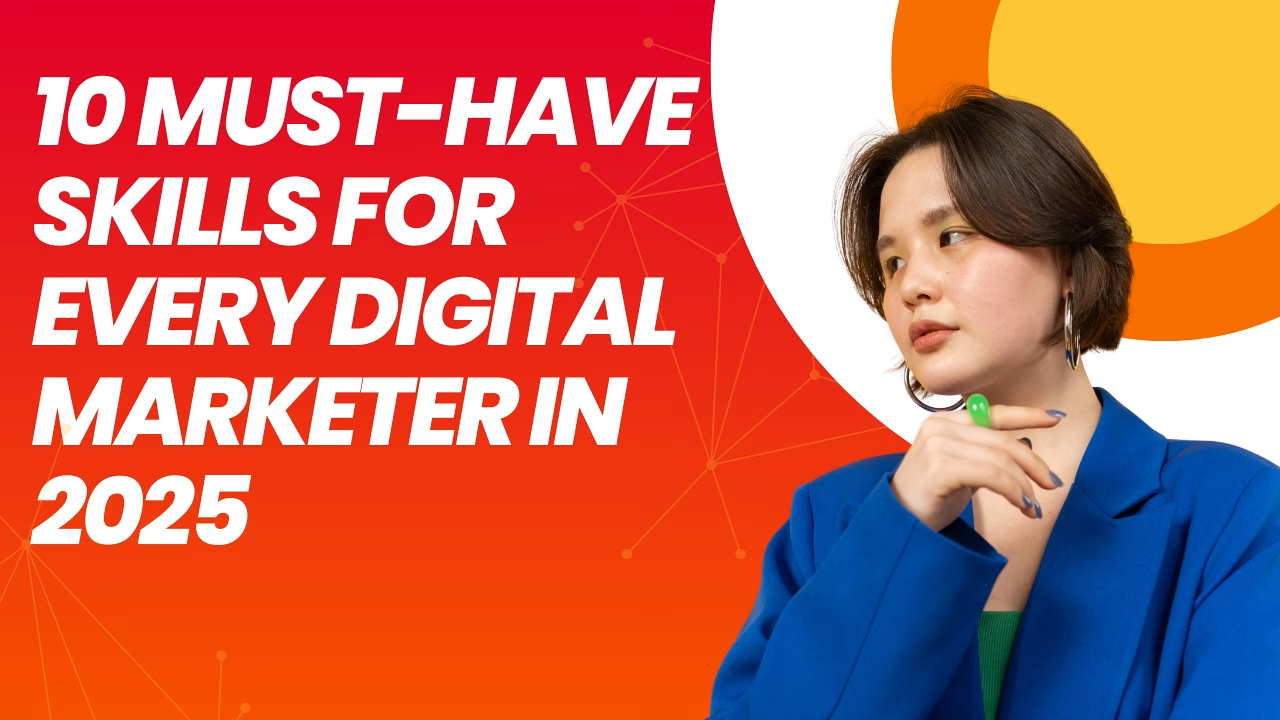10 Must-Have Skills for Every Digital Marketer in 2025

In today’s digital age, businesses need strong digital marketing to stay ahead. With technology changing fast, marketers must have the right skills to reach and connect with their audience. Whether you’re new to digital marketing or looking to improve, mastering these 10 essential skills will help you stand out and drive success. From understanding SEO to creating engaging content and analyzing data, these skills will equip you to navigate the ever-evolving digital landscape. Let’s explore the key skills every digital marketer needs to thrive in this fast-paced world and achieve lasting results for their business.
1. Search Engine Optimization (SEO)
SEO is fundamental for driving organic traffic to your website. It’s not just about stuffing keywords into your content—it’s about understanding how search engines rank pages and optimizing your site for better visibility. Key components of SEO include:
- Keyword Research: Tools like Google Keyword Planner, SEMrush, and Ahrefs help identify high-volume, low-competition keywords that can attract more targeted traffic. Effective keyword research allows you to prioritize what topics to create content around.
- On-Page Optimization: This involves optimizing the content of individual web pages for SEO. Focus on elements like title tags, meta descriptions, headers (H1, H2, etc.), and image alt texts to help search engines understand the page’s content. Ensure the content answers the user’s query and provides high value.
- Backlink Building: Quality backlinks from reputable sites signal to search engines that your content is trustworthy and authoritative. This requires strategies like guest blogging, influencer outreach, and creating shareable content like infographics.
- Technical SEO: Factors such as page load speed, mobile-friendliness, and site architecture also influence SEO rankings. Regularly monitoring these factors ensures a site’s technical aspects are optimized for search engines.
- Algorithm Updates: Stay updated on algorithm changes from search engines like Google. These updates can significantly impact your rankings, so being adaptable is key to maintaining SEO performance.
2. Content Marketing
Content marketing is the backbone of a successful digital marketing strategy. Creating content that is informative, engaging, and relevant to your audience can help build brand authority and trust. Key aspects of content marketing include:
- Content Creation: Writers, designers, and video producers must craft valuable content tailored to the audience. Blog posts, ebooks, whitepapers, videos, and infographics are all forms of content that can engage users and drive traffic.
- Content Distribution: Publishing content on your website is just one part of the equation. Content must also be effectively distributed across channels such as social media, email newsletters, and third-party platforms to maximize reach.
- Storytelling: Great content is not just informative—it tells a compelling story that resonates with your audience. Understanding the pain points of your audience and offering solutions through engaging narratives is vital.
- Performance Measurement: Using tools like BuzzSumo, Google Analytics, and HubSpot helps analyze how content is performing. Tracking metrics such as traffic, engagement, and conversions can inform future content strategies.
3. Social Media Marketing
With billions of active users across various platforms, social media marketing allows businesses to directly connect with their target audience. To excel in social media marketing, digital marketers must:
- Platform-Specific Strategy: Each social media platform has its unique user behavior, content preferences, and engagement patterns. Crafting tailored strategies for Facebook, Instagram, LinkedIn, TikTok, and others ensures you can make the most of each platform’s strengths.
- Content Creation and Engagement: Engaging content is essential. This could include regular posts, stories, videos, and polls. The content must encourage audience interaction and help build a community around your brand.
- Analytics: Social media tools like Hootsuite, Buffer, and Sprout Social allow marketers to track campaign performance, audience growth, engagement rates, and competitor activities. This data helps refine social media strategies.
- Adaptation to Trends: Social media algorithms change frequently, and so do content trends. Marketers need to stay updated on trending hashtags, formats (such as Reels or Stories), and viral campaigns to maintain relevance.
4. Data Analytics
The ability to interpret and leverage data is essential for making informed decisions and optimizing digital marketing campaigns. Key data analytics skills include:
- Website Analytics: Tools like Google Analytics provide insights into user behavior, traffic sources, bounce rates, and conversions. Understanding this data allows marketers to identify areas for improvement on their website or landing pages.
- Campaign Performance: Monitoring metrics such as Cost Per Acquisition (CPA), Click-Through Rates (CTR), and Return on Ad Spend (ROAS) helps evaluate the effectiveness of paid campaigns and organic efforts.
- User Behavior Analysis: Analyzing user actions such as session duration, pages viewed, and where visitors drop off can uncover issues and opportunities for optimization. Tools like Hotjar provide heatmaps and session recordings to help visualize these behaviors.
- Reporting: Presenting data in a digestible, actionable format is vital for decision-makers. Using data visualization tools such as Tableau or Power BI can help simplify complex datasets into clear insights.
5. Pay-Per-Click (PPC) Advertising
PPC advertising offers a way to target specific audiences with precision. Mastering PPC involves several crucial skills:
- Keyword Selection: Similar to SEO, PPC relies heavily on selecting the right keywords to target. Researching keywords with high intent and low competition ensures efficient spending.
- Ad Copy Creation: Writing compelling ad copy that sparks interest and convinces users to click is key. The copy must be clear, concise, and contain a strong call to action.
- Campaign Optimization: Regularly tweaking campaigns by adjusting bids, targeting, and ad copy can ensure better ROI. Testing different versions of ads (A/B testing) helps identify the most effective approach.
- Analytics and Adjustments: Continuously monitor the performance of PPC campaigns through tools like Google Ads and Bing Ads. Adjusting your strategy based on metrics like Cost Per Click (CPC) and Conversion Rate (CVR) helps improve your campaign’s overall effectiveness.
6. Email Marketing
Despite being one of the oldest forms of digital marketing, email marketing remains one of the most effective ways to nurture relationships and drive conversions. Key components of email marketing include:
- List Segmentation: By dividing your email list into specific segments (such as location, behavior, or stage in the sales funnel), you can send targeted and personalized emails that are more likely to engage recipients.
- Personalization: Crafting emails with personalized subject lines, content, and offers increases the likelihood of engagement. Personalization helps make the communication feel more relevant to each recipient.
- Automation: Using tools like Mailchimp and ActiveCampaign to automate email sequences can save time and ensure consistent communication. Automated workflows for lead nurturing, welcome emails, or re-engagement campaigns are highly effective.
- Performance Tracking: Email performance can be tracked through open rates, click rates, bounce rates, and conversions. This data helps refine strategies for future email campaigns.
7. Marketing Automation
Marketing automation enables marketers to streamline repetitive tasks, allowing them to focus on strategy. Key skills in marketing automation include:
- Workflow Creation: Designing automated workflows for tasks such as lead nurturing, email sequences, and customer retention can save time and ensure consistent messaging.
- Lead Scoring: Using automation tools like Marketo or HubSpot, marketers can score leads based on engagement, demographics, and behavior, allowing sales teams to prioritize high-potential prospects.
- Multi-Channel Automation: Automation should not just be limited to emails. Integrating automation across social media, landing pages, and paid advertising campaigns ensures a consistent experience for customers.
8. Conversion Rate Optimization (CRO)
The goal of any digital marketing campaign is to convert visitors into customers. CRO involves refining your website or landing pages to maximize conversions. Critical CRO skills include:
- A/B Testing: Continuously testing variations of landing pages, CTA buttons, forms, and content layouts helps determine what drives the best results.
- Behavior Analysis: Tools like Hotjar allow marketers to visualize user behavior on the website, identify friction points, and optimize the user journey.
- User Experience (UX) Design: Ensuring a seamless and intuitive experience on your website is essential. This includes optimizing navigation, reducing load times, and ensuring mobile responsiveness.
9. Video Marketing
With video content becoming increasingly dominant, video marketing is a skill every marketer should master. This includes:
- Video Production: Understanding the basics of creating high-quality videos (such as scripting, shooting, and editing) is crucial. Videos must be engaging and aligned with the brand’s message.
- SEO for Videos: Just like text content, videos need to be optimized for search engines. This includes crafting effective titles, descriptions, tags, and ensuring videos are mobile-friendly and optimized for platform algorithms.
- Platform Distribution: Platforms like YouTube, TikTok, and Instagram Reels provide different opportunities for video content. Each platform requires its own strategy to engage users and drive views.
- Metrics Tracking: Video marketers should track metrics such as views, engagement rate, shares, and click-through rates to evaluate video performance.
10. Basic Coding and Web Design
While digital marketers are not expected to be expert developers, understanding the basics of coding and web design can help them make small tweaks to websites and improve overall user experience. Key skills include:
- HTML/CSS: Knowledge of basic HTML and CSS allows marketers to edit web pages, adjust layout, or optimize content formatting without relying on developers.
- CMS Platforms: Familiarity with WordPress and other content management systems enables marketers to manage and update content easily.
- Responsive Design: With mobile internet usage on the rise,
Final Thoughts
Digital marketing is a dynamic field that demands continuous learning and adaptation. By mastering these 10 essential skills—SEO, content marketing, social media marketing, data analytics, PPC, email marketing, marketing automation, CRO, video marketing, and basic coding—you’ll be well-equipped to drive growth and achieve your marketing goals. Invest in these skills today, and watch your digital marketing career soar.




